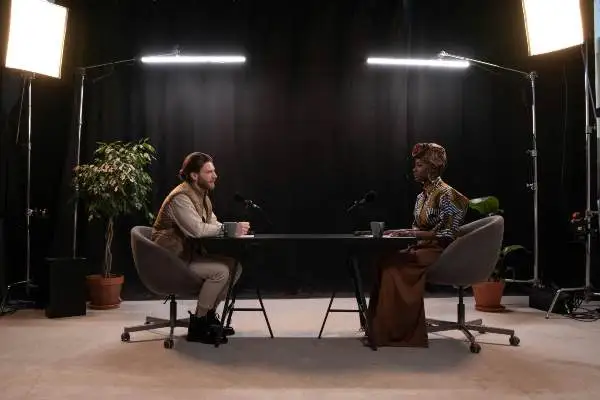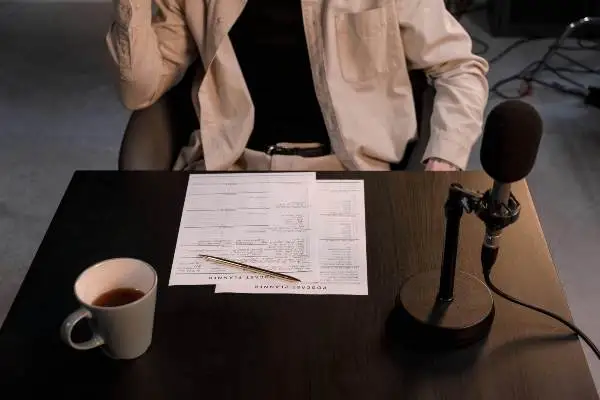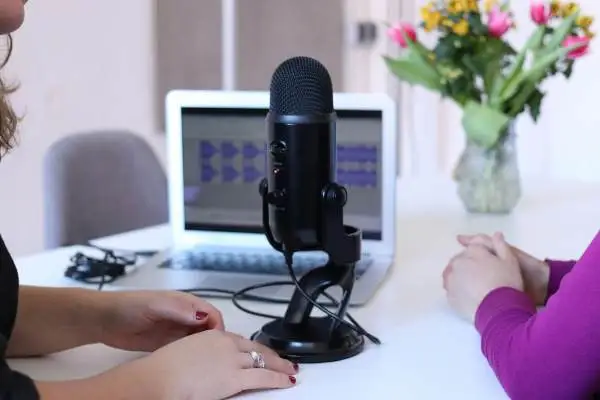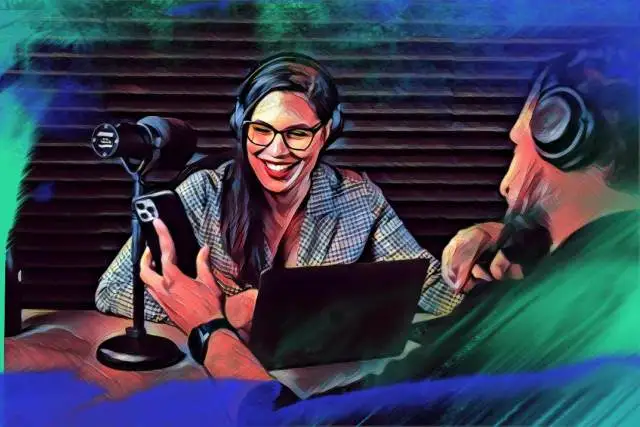Music is one of the important audio cornerstones that separates professional podcasts from a mere recorded conversation. The right music can help make a narrative podcast more immersive or provide polished packaging for your interview talk show. However, navigating the world of licensing music properly can be more challenging than you might expect, especially if you haven't sought out similar copyrighted music in the past.
Fortunately, there are several ways to obtain a music license for your podcast which we'll walk you through below. In this guide, we'll outline multiple ways to legally obtain music and share a couple of spots in which you might want to insert music into your podcast.
Where Do I Need Podcast Music?
If you're new to the podcast game, you might not know the best spots to insert quality music into your content. Here are a couple of common places to consider bringing tracks into your recording:
Intro Music
Most podcasts have some sort of introductory music, whether it opens up the beginning of the podcast, or is played after a cold open or teaser clip. Some podcasters might also play intro music underneath an opening quote or interesting snippet. Intro music on a podcast can span anywhere from a couple of seconds to just over a minute. This music is typically gradually faded out as the bulk of the conversation takes over the podcast.
Sponsor Music
If your podcast hosts sponsors, those adverts will likely host their own background music. The responsibility to clear this music is placed on the advertiser, but it's worth noting that an advert can switch up the composition and flow of your podcast for this reason.
In Between Segments
Some podcasters may choose to insert music or sound effects in between segments. This can help serve as a bridge between various parts of the podcast and break up an otherwise long stretch of audio. Giving your audience distinct "chapters" can make it easier to keep a listener's attention over time. For example, listeners can hop back into the same chapter on different occasions rather than having to sit through a long podcast in one sitting.
Outro Music
Similar to introductory music, outro music is used to close out the podcast. Some podcasters may overlay outro music with credits, special thanks, or outtakes from the longer conversation. Occasionally, the outro music is the same as the intro music, but they can also be completely different. In which case, each track needs its own license accordingly.
Where Can I Get Music for Podcasts?

The way you license music for podcasts will vary depending on which route you take:
Royalty-Free Music Libraries
There are plenty of royalty-free music libraries that allow you to purchase music license on a case by case basis or on a subscription basis. Some examples of these track libraries include sites like Artlist, Thematic, Envato, or Audio Jungle. These sites may require you to download copies of the licenses you're actively using, and may have different crediting requirements depending on the creator of the track.
Make Your Own Podcast Music
If you're a musician or producer, making your own podcast music is both a fun exercise and an excellent way to cut back on unnecessary production costs. As long as you are the sole creator of a music track, you own that music license allowing you to use your own tracks anywhere in your podcast or content as needed. However, if you bring collaborators into your process, you'll want to receive written permission to use your collaborative track in a podcast, just in case.
License Music
If you have a track in mind that you'd like to license for a podcast, you might be able to obtain a music license following the outlined steps below. Securing rights for a commercially released track is not guaranteed and often comes with a monetary cost, and can take potentially months to secure.
How Much Does It Cost to License Music for a Podcast?
The price of music licensing depends on your method of securing tracks for your content. For example, if you make your own music, the licensing cost could be zero: other than the time you put into crafting a custom track. You could also sign up for a music library that hosts royalty free music which can be used accordingly in your podcast: these subscriptions range from a couple of dollars a month to several hundred dollars a year depending on your choice of library and individual usage patterns.
Keep in mind that music license libraries like the above described are often a recurring expense, which might not be preferable for certain creators.
That being said, the most variable cost of licensing music for podcast is securing rights for a traditional or commercial track that has already been released. There is really no telling how much securing these rights could cost you, but you can expect to pay between hundreds to thousands of dollars depending on the track and your negotiated usage.
While not a hard and fast rule, it's not unreasonable to expect to pay more for a song for a popular artist than a track from a musician at a more independent level. Remember that artists are not obligated to license out podcast music in any capacity, so there's a real possibility that you won't have the option to purchase rights for music licensing in your podcast.
How to License Music for Podcast Episodes

If you have a particular track in mind for background music, podcast intro music, or for a special segment in your content, here are the steps you'll need to run through in order to properly obtain your license. Keep in mind that just because you intend to clear a license, doesn't necessarily mean you'll be afforded the copyrighted music. Hence, you do not have permission to use a track until you have properly run through and completed each of these essential music licensing steps:
Determine the Copyright Owners
To earn a music license, you have to track down the copyright owners of the track. This includes two groups: 1) The owner(s) of the master recording and (2) The owner(s) of the publishing copyright. Master right's holders can typical be found in the credits of a music recording, through sites like All Music. Publishing owners can be found through databases like ASCAP or BMI. To clear a music license, both parties need to be successfully contacted.
Negotiate Your Terms of Use
Once you're in contact with the right's holders, explain exactly how you intend to use the music, and in what context. If possible, showcase an unreleased, private podcast episode demonstrating the ways in which you envision using the licensed music. From there, it's up to you and the rights' holders to negotiate rates as needed.
Secure the Music Rights
After coming to a written agreement and settling finances, secure the music license as needed. Congratulations! You can now start to use your licensed track(s) in your podcast. Keep in mind that music license are subject to variable term lengths: if your license expires over the next couple of years, you'll have to come back to the right's holders and renew or renegotiate to maintain the music license as needed.
Credit Rights Holders as Needed
Keep in mind that after you secure your music license, you might be asked to credit rights holders across certain mediums, such as the credits section of your podcast. Be sure to uphold any terms negotiated into your music license.
How to Edit Music Into Your Podcast
Once you license podcast music, it's time to put it to good use! Here is how you take tracks from your music library and bring them into your podcast mix:
Ensure You Have Permission From the Music's Copyright Owner
As stated above, having a proper license for music used in your podcast isn't just courteous, it's essential. Make sure you have necessary permissions and follow any other stipulations regarding crediting composers or right's holders across various distribution platforms as needed.

Track Organization
Keep your files organized and named properly throughout the editing process. When you're introducing music, sound effects, and multiple audio tracks, things can get confusing very quickly. File path structure is more important than your might expect and if you set up your project properly and organize from the get-go, you'll definitely thank yourself later.
LUFs
LUFs is a standard loudness measurement that tracks output levels over a certain period of time. Podcasts naturally contain dynamic audio as you're constantly switching between music to speech to sound effects and back again. It's generally accepted that if you normalize audio between -15 and -20 LUFs, you'll be in an acceptable range for distribution across streaming platforms like Spotify and Apple Podcasts.
Fade Ins and Outs
While this suggestion is more stylistic than anything else, the licensed music included in your podcast should likely be experienced gradually, rather than stopping and starting abruptly over the course of your content. Use volume fades to bring your music in and out of your episode to help the conversation and musical accompaniment to flow smoothly.
Edit Podcasts with the Right Tools
If you're editing your podcast yourself, you'll need to have access to a digital audio workstation, or DAW. You can use free options like Audacity or Garageband, but there is a chance that these affordable options won't have the flexibility you need to edit a complex podcast from start to finish. Some paid common DAWs include the likes of Avid's Pro Tools, Adobe's Audition, Logic, and Ableton Live. You can always explore the free trials of these audio editors to find what workflow performs best for your needs.
Music licensing is not a process to be taken lightly. If you don't have proper permissions to use a track, you're liable to incur all sorts of copyright conundrums not limited to having your podcast taken down due to copyright strikes or even being sued by the rights holder of the music. The same goes for unlicensed sound effects, clips, and any other piece of content that requires clearance from a publishing company.
If you don't have the funds or time needed to secure the necessary copyright rights, it's best to either craft your own music or opt for a royalty-free music service or track library that allows you to streamline the process. Enjoy selecting the perfect soundtrack for your podcast. Quality audio can take time to secure, but if you follow the steps outlined in this guide, you'll be able to find the best music for your podcast in no time at all.





